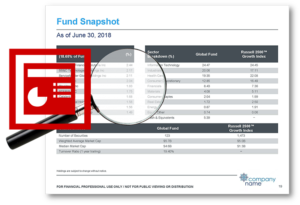How Smart Investment Marketers Buy Tech
 What role does technology play in your financial marketing strategy?
What role does technology play in your financial marketing strategy?
Changing regulation, customer behavior, and competition are changing the way financial brands conduct marketing, and new technologies have become a vital part of the plan.
From marketing automation and sales enablement to data management and reporting platforms, there is an abundance of financial marketing technology available to help marketers take their brands to the top.
The modern marketer needs to be tech-savvy
Smart marketers are leading the way in their organizations, pushing for change, and disrupting the status quo. Marketing roles are evolving, and the line between marketing and IT has become increasingly blurred. This means that in many cases, marketers have become the chief buyers of certain technologies and must understand how to make sound buying decisions on behalf of their organization.
Related: New Route into the C-Suite: The Chief Marketing Technology Officer (CMTO).
With a flurry of tech companies emerging out of the fintech boom, it’s imperative for marketers to have a proper strategy for vendor selection. As the number of options continues to increase, so does the pressure to make the right choices. This It also requires an even tighter collaboration between IT, Marketing, and Compliance departments to develop solutions that make sense for the enterprise.
Navigating the sea of marketing technologies
It’s one thing to evaluate lower-cost, lower-risk software solutions that can bypass IT, but it’s quite another to evaluate and select a technology vendor for a high-end or custom solution that involves cooperation from stakeholders in other departments. Technology implementations of this caliber require your firm to invest hundreds of thousands of dollars and a lot of manpower. You need to trust that the solution will yield results and return on investment for the long term. By taking on this role, you’re adding technology strategy and vendor selection to your resume and the criteria upon which your career success will be evaluated.
According to the CMO of Integrate, Scott Vaughan, when evaluating high-end technology solutions for your firm, it’s imperative to assess the business value of each solution. The growing number of marketing tech solutions has created major challenges for marketing teams including wasted time, budget, and resources. This is due to how often technology doesn’t fulfill its ambitious promises. Marketers must avoid this trap by arming themselves with ways to evaluate solutions earlier in the research process.
The 3 tech vendors to avoid
In addition to proper research and preparation, marketers involved in the technology buying process should learn to spot these types of irresponsible vendors:
The “Yes-Man”
This might be obvious, but be wary of vendors who promise to meet all of your requirements in less time and for the lowest price. 99.99% of the time, this is too good to be true. If a vendor immediately jumps to the conclusion that they have the perfect solution for you, turn and run for the hills. A legitimate solution salesperson will center the conversation around your needs. Furthermore, they’ll ask a series of questions to determine your pain points and make a fair assessment of your situation. Look for discussions of trade-offs, war-stories of similar projects, and honest appraisals of timelines and dependencies. You should feel more comfortable with someone saying, “I’m not sure I can help you” as opposed to “Yes, we can do anything, let’s get drinks.” This is a high-stakes deal. Everyone should be transparent about their wants, needs, and abilities.
Use the vendor’s website and published content to validate that they really do have expertise in the field and that they are in fact pursuing that direction strategically, not just opportunistically.
The “one size fits all” solution
Every firm’s needs are unique. No two businesses run their operations the same way, so how could one technology solution be the answer? Don’t get me wrong, productized technology is extremely valuable, as it allows for a sustainable solution that isn’t off-the-charts expensive and time consuming to deploy. However, the solution should be product-based with the flexibility to be customized to your unique business needs. Simply put, you don’t want someone building you a custom solution from scratch or trying to fit you into an out-of-the-box solution. The best solution usually lies somewhere in-between as a semi-custom offering. This means that most of the components of the deliverable already exist and have been proven in similar real-world deployments. The rest can be fine-tuned to really accommodate your specific needs.
The “seamless integration”
We are all guilty of using this term in marketing copy, aren’t we? “Seamless integration” sounds nice and wonderful and painless. But let’s be honest, no integration is truly seamless. What you really want to hear from a vendor is that they have the technology architecture, experience, and expertise to integrate their solution with your existing systems. In other words, focus on learning the practical limits of the vendor, the situation, and what business compromises these may create. This will require getting your IT and security team involved. However, be careful about seeding control of the effort to these teams. Don’t let them kill your initiative with well-intentioned obstacles and concerns.
Ask your vendors for implementation guides or case studies that demonstrate the work they’ve done for other firms with similar challenges. Be aware that in the industry of sensitive client data, there are real security and compliance concerns. Never underestimate the barriers that security might create to a truly seamless integration story.
The 3 tech vendors to engage
Once you’ve identified the irresponsible vendors, how do you narrow down your list of viable options? Here are a few qualities to look for in a technology partner:
Experts in financial services technology
Look for vendors who specialize in your field. There are tech companies that service multiple industries. That isn’t necessarily problematic, but make sure they really understand your business problems. You don’t want to be caught in a situation where you’re trying to retrofit your business needs into a broad solution. An experienced vendor providing solutions and support for your industry will understand your specific pain points. And, they’ll be in a better position to satisfy your requirements. An industry expert may also help you define your requirements based on their years of applicable experience.
A client-base who raves about them
All too often, we’ve seen prospective clients missing this critical step in their RFP process: calling references. It may sound implausible, but 75% of the time, our client references are never called. This is a big mistake. And in most cases, even if client references are called, they may not be taken as seriously as they should. Don’t let this critical piece of the puzzle take a back seat in your vendor selection process. It might seem like a waste of time, but you can find out a lot from a client reference interview if you ask the right questions. Ask to speak to a client who had a similar integration to provide some common ground. Here are a few point-blank questions you should ask to find out what a client really thinks of the vendor.
Related: Why Your RFP Process is Lousy (And 6 Rules For Success)
A nimble organization
In an ever-changing regulatory environment, it’s important to select a vendor that can turn on a dime when the need arises. This means the technology solution is adaptable enough to make mission-critical changes very quickly. Find case studies and examples to illustrate the vendor’s ability to turnaround a solution quickly without sacrificing quality.
Be wary of vendors that are too strictly “waterfall” oriented in their methodology. Being able to call an audible on a project spec mid-stream can be the savior of an initiative.
Conclusion
As marketing technologies continue to emerge and evolve, marketing decision-makers must learn to navigate the sea of possibilities. For marketing professionals responsible for purchasing technology solution, it’s extremely important to have a strategy for vendor selection. Performing your due diligence can ensure a final solution that best suits the needs of your organization.
Did you like this post? Please share! You can also subscribe to our blog.
Download our White paper: Make vs. Buy: Should Your Financial Services Firm Insource or Outsource Technology?
Here are some related resources that might interest you: From the Blog: The Biggest Mistake in Your Technology RFP Process |  From the Blog: Why Your Technology RFP Process is Lousy (And 6 Rules for Success) |  From the Blog: How much does it cost to automate factsheets? 🧐 |




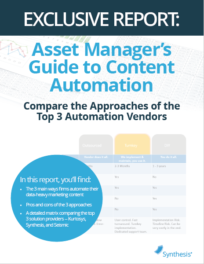 Compare the Top 3 Finserv Content Automation Vendors [White paper]
Compare the Top 3 Finserv Content Automation Vendors [White paper]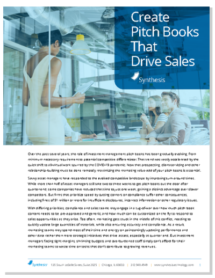 Create Pitchbooks the Drive Sales [White paper]
Create Pitchbooks the Drive Sales [White paper]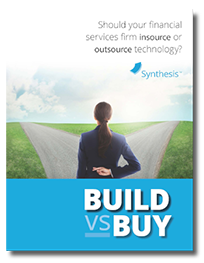 Build vs. Buy: Should Your Financial Services Firm Outsource or Insource Marketing Technology? [White paper]
Build vs. Buy: Should Your Financial Services Firm Outsource or Insource Marketing Technology? [White paper] 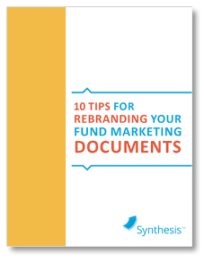 10 Tips for Rebranding your Fund Marketing Documents [White paper]
10 Tips for Rebranding your Fund Marketing Documents [White paper]